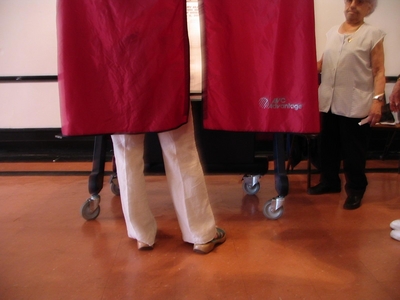Lawmakers in Trenton recently passed legislation to limit abuses in absentee ballot voting – potentially cutting down on dirty tricks in local elections.
The “vote-by-mail” law, which went into effect July 1, could have major implications for several close races this fall, including the statewide race for governor and the local mayoral race in Secaucus.
Following a national trend, the state relaxed its absentee voting laws four years ago. Previously, voters had to provide a reason – such as illness, disability, or travel – why they needed to vote absentee. But after absentee voting laws were loosened in 2005 such reasons were no longer needed to vote by mail and allegations of aggressive campaigning increased.
Savvy campaign workers figured out that close elections, and ones with low voter turnout, are often determined by absentee ballots. In Hoboken, for example, 700 absentee ballots decided the winner of last month’s runoff between mayoral candidates Dawn Zimmer and Peter Cammarano. While Zimmer beat Cammarano by more than 200 votes on the machines, Cammarano had amassed hundreds of absentee ballots before the election and pulled ahead of Zimmer in the final count.
In the last few years, the laws to relax absentee voting were actually passed in many states to increase voter participation in a nation where only 54 percent of eligible citizens typically cast ballots for president.
“It just doesn’t look right when someone brings in a huge basket full of 100, 200 absentee ballots.” – Joan Quigley
________
Winning the vote, before Election Day
The strategy of racking up absentee ballots recently proved successful for Secaucus Board of Education member Gary Riebesell.
“This year, the school board election was scheduled during a school recess,” Riebesell noted. “Knowing that these elections have low turnout as it is, I had to get out and hustle. I knew a lot of people would be going away, and I did ask people to vote using the absentee ballot. It helped me out a great deal.”
Riebesell, who had lost a bid for the school board the pervious year, estimates he received 94 or 95 absentee ballots in the April 2009 election. He emphasized that he “asked” voters to consider voting absentee, and did not personally collect many ballots from residents.
But candidates blessed with large armies of campaign workers often had volunteers collect dozens – and sometimes hundreds – of absentee ballots in a practice known as “bundling.”
This created the appearance of abuse, according to State Assemblywoman Joan Quigley, who lives in Jersey City and co-sponsored the “vote-by-mail” legislation.
“We needed to tighten up the absentee voting process,” she said last week. “The ‘no excuses’ law, which I supported, had some loose ends that needed to be tied up. I can’t say there were always abuses, but there were always perceptions of abuse. It just doesn’t look right when someone brings in a huge basket full of 100, 200 absentee ballots. We don’t want to see heavy-handed solicitation of votes, or abuses in a system that’s really meant to make the process easier for voters.”
Under a key provision of the new law, each third party will be able to collect no more than 10 absentee ballots from voters in an election.
“This is going to shake up the street workers in campaigns,” Quigley added. “Now, they won’t be able to go into apartment buildings, senior residences, or other large facilities and come out with a basket full of ballots.”
Another key provision of the law requires that the names of voters who request an absentee ballot be flagged at polling centers to prevent people from voting twice, once by absentee and again in person.
Impact on Nov. races?
How the law may impact upcoming elections this fall remains to be seen.
The November mayoral election in Secaucus between incumbent Dennis Elwell and Town Councilman Michael Gonnelli is expected to be close and could well be decided by absentee votes, much like the recent mayoral race in Hoboken.
E-mail E. Assata Wright at awright@hudsonreporter.com.
